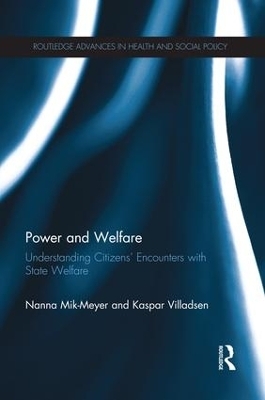
Power and Welfare
Understanding Citizens' Encounters with State Welfare
Seiten
2014
Routledge (Verlag)
978-1-138-81784-5 (ISBN)
Routledge (Verlag)
978-1-138-81784-5 (ISBN)
When the state punishes criminals or removes children at risk, its power is immediately apparent. However, power is also at stake when the state seeks to educate, advise, or empower citizens, and this book encourages reflection on the exercise of professional power in these less coercive encounters.
In the welfare provision of today, power takes both the shape of juridical sanctions and of attractive offers for self-development. When state institutions punish criminals, remove children at risk, or enforce sanctions upon welfare recipients the question of power is immediately urgent. It is less readily evident that power is at stake when institutions educate, counsel or ‘empower’ citizens. This book offers a framework for understanding and analyzing these complex and implicit forms of power at play in the encounters between citizens and welfare institutions.
Taking as its starting point the idea that power takes many different shapes, and that different approaches to power may be necessary in the diverse contexts where citizens encounter welfare professionals, the book demonstrates how significant social theorists, spanning from Goffman to Foucault, can be used for inquiries into these encounters. Guiding the reader from their epistemological foundations to lucid ‘state of the art’ case examples, the book unpacks each of its six theoretical perspectives, and explains selected key concepts and explicates their potential for analysis. The final chapter discusses the usefulness of the theoretical approaches, their weaknesses and indicates some possibilities of theoretical integration.
Including case studies of patients, nursing home residents, unemployed people, homeless people, and young offenders, from the USA, Denmark, France, Sweden, Canada, and Australia, Power and Welfare is designed for students and researchers of social policy, sociology, anthropology, political science, education, nursing and social work.
In the welfare provision of today, power takes both the shape of juridical sanctions and of attractive offers for self-development. When state institutions punish criminals, remove children at risk, or enforce sanctions upon welfare recipients the question of power is immediately urgent. It is less readily evident that power is at stake when institutions educate, counsel or ‘empower’ citizens. This book offers a framework for understanding and analyzing these complex and implicit forms of power at play in the encounters between citizens and welfare institutions.
Taking as its starting point the idea that power takes many different shapes, and that different approaches to power may be necessary in the diverse contexts where citizens encounter welfare professionals, the book demonstrates how significant social theorists, spanning from Goffman to Foucault, can be used for inquiries into these encounters. Guiding the reader from their epistemological foundations to lucid ‘state of the art’ case examples, the book unpacks each of its six theoretical perspectives, and explains selected key concepts and explicates their potential for analysis. The final chapter discusses the usefulness of the theoretical approaches, their weaknesses and indicates some possibilities of theoretical integration.
Including case studies of patients, nursing home residents, unemployed people, homeless people, and young offenders, from the USA, Denmark, France, Sweden, Canada, and Australia, Power and Welfare is designed for students and researchers of social policy, sociology, anthropology, political science, education, nursing and social work.
Nanna Mik-Meyer is Associate Professor in the Department of Organization and the Director of the Center for Health Management at Copenhagen Business School, Denmark. Kaspar Villadsen is Associate Professor in the Department of Management, Politics and Philosophy, Copenhagen Business School, Denmark.
1. Introduction 2. Foucault: The Flexible Critique of Welfare 3. Goffman: Interaction and Identity Negotiations 4. Bourdieu: Field, Symbolic Violence and Domination 5. Luhmann: Welfare in Communicative Systems 6. Neo-Institutional Theory: Myths and Legitimacy 7. Risk Theory: Normality, Deviation and Neo-Liberalism 8. Transcending the Approaches
| Erscheint lt. Verlag | 12.9.2014 |
|---|---|
| Reihe/Serie | Routledge Advances in Health and Social Policy |
| Verlagsort | London |
| Sprache | englisch |
| Maße | 156 x 234 mm |
| Gewicht | 294 g |
| Themenwelt | Sachbuch/Ratgeber ► Gesundheit / Leben / Psychologie |
| Medizin / Pharmazie ► Pflege ► Ausbildung / Prüfung | |
| Sozialwissenschaften ► Pädagogik ► Sozialpädagogik | |
| Sozialwissenschaften ► Soziologie | |
| Wirtschaft ► Betriebswirtschaft / Management ► Planung / Organisation | |
| Wirtschaft ► Volkswirtschaftslehre | |
| ISBN-10 | 1-138-81784-8 / 1138817848 |
| ISBN-13 | 978-1-138-81784-5 / 9781138817845 |
| Zustand | Neuware |
| Haben Sie eine Frage zum Produkt? |
Mehr entdecken
aus dem Bereich
aus dem Bereich
Buch | Spiralbindung (2024)
Urban & Fischer in Elsevier (Verlag)
CHF 26,60
Buch | Spiralbindung (2024)
Urban & Fischer in Elsevier (Verlag)
CHF 48,80


